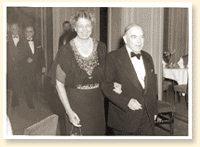

William Lyon Mackenzie King, with Eleanor Roosevelt, wife of the US president, 1943. |
Politics and Government: William Lyon Mackenzie King
William Lyon Mackenzie King (1874-1950), head of the Liberal
government throughout the Second World War, was Canada's greatest
political survivor: prime minister in the 1920s, when the country
became independent from Britain; in the Depression-ravaged 1930s;
and in the 1940s, the years of war and the Cold War which followed.
King led Canada for 22 years in all: 1921-1926, 1926-1930 and
1935-1948, and he added the duties of foreign minister for almost
all those years as well. His constant wartime goal, and greatest
success, was to prevent the split between English and French Canada
which had occurred over compulsory military service during the First
World War ( see
Conscription ). As one writer has said, he always looked at Canada
and its politics through the prism of national unity -- keeping
a big, diverse, easily-divided country together. Related Newspaper Articles
English Articles
French Articles
-
Programme militaire de M. King
Le Devoir, 21/05/1940
-
Déclaration de M. Mackenzie King sur le Canada et la guerre
Le Devoir, 05/06/1940
-
Les 21 ans de M. King à la tête du parti libéral
Le Devoir, 08/08/1940
-
Ce que signifierait pour nous la défaite de la démocratie en Europe
Le Devoir, 03/09/1940
-
M. King fait appel au ralliement de toutes les forces du pays "pour préserver du désastre la civilisation chrétienne"
Le Devoir, 03/02/1941
-
À Ottawa. "Nous passons une loi qui engage le Canada à l'effort de guerre le plus stupéfiant de son histoire" (M. King)
Le Devoir, 26/03/1941
-
La déclaration de Hyde Park. "C'est une entente conjointe entre le Canada et les États-Unis pour venir en aide à la Grande-Bretagne" (M. King)
Le Devoir, 29/04/1941
-
Le 24 juin. Texte du message de M. Mackenzie King aux Canadiens français
Le Devoir, 25/06/1941
-
Désagréable manifestation de soldats à M. King
Le Devoir, 25/08/1941
-
Le plébiscite sur la conscription. "Il existe aucune entente, tacite ou expresse, entre moi-même et M. Godbout ou qui que ce soit au monde" (M. King)
Le Devoir, 28/01/1942
-
"Le plébiscite. M. King demande à la nation de faire confiance au gouvernement, le 27 avril "
Le Devoir, 08/04/1942
-
M. King fait du plébiscite un vote de confiance
Le Devoir, 25/04/1942
-
Le plébiscite. Texte de la déclaration de M. King
Le Devoir, 12/05/1942
-
Le travail des femmes à l'usine. La déclaration de M. King
Le Devoir, 27/05/1942
-
La conscription pour outre-mer. M. King s'engage à poser la question de confiance.
Le Devoir, 08/07/1942
-
"Sans le Canada, la Grande-Bretagne n'aurait pu résister"
Le Devoir, 11/09/1942
-
M. King expose sa politique étrangère
Le Devoir, 05/08/1944
-
M. King en faveur d'un drapeau canadien
Le Devoir, 12/08/1944
-
Lettre d'Ottawa. La participation du Canada à la guerre du Japon
Le Devoir, 05/04/1945
-
La session fédéral. Le service dans le Pacifique sera volontaire
Le Devoir, 05/04/1945
|